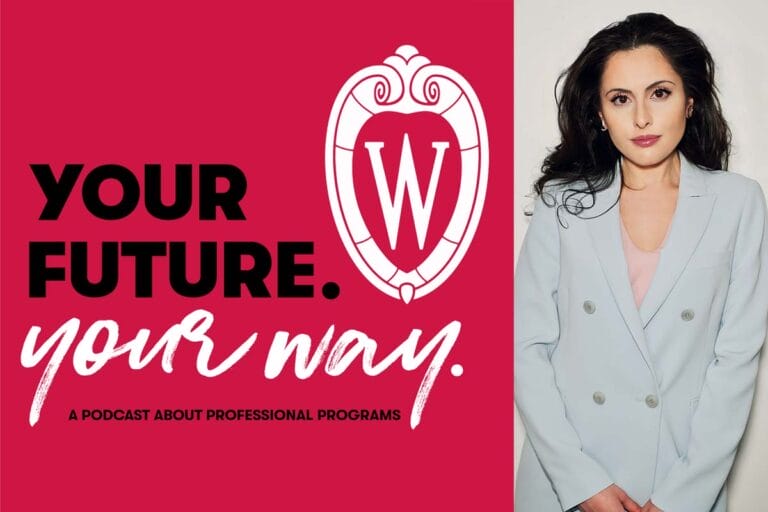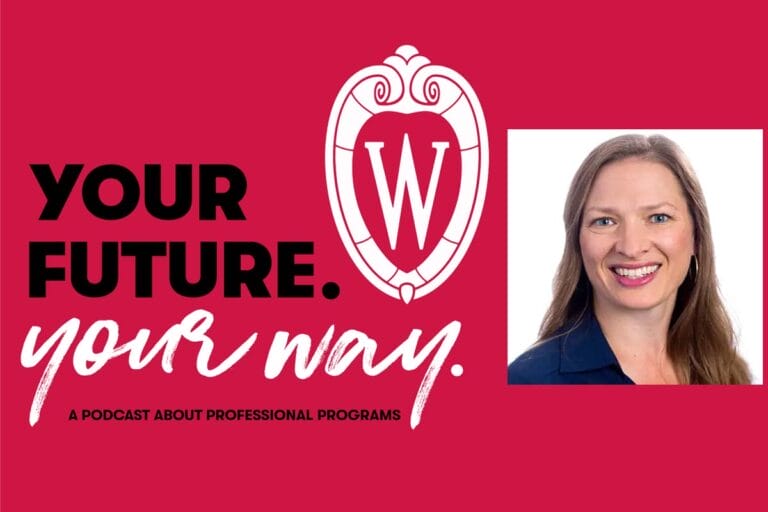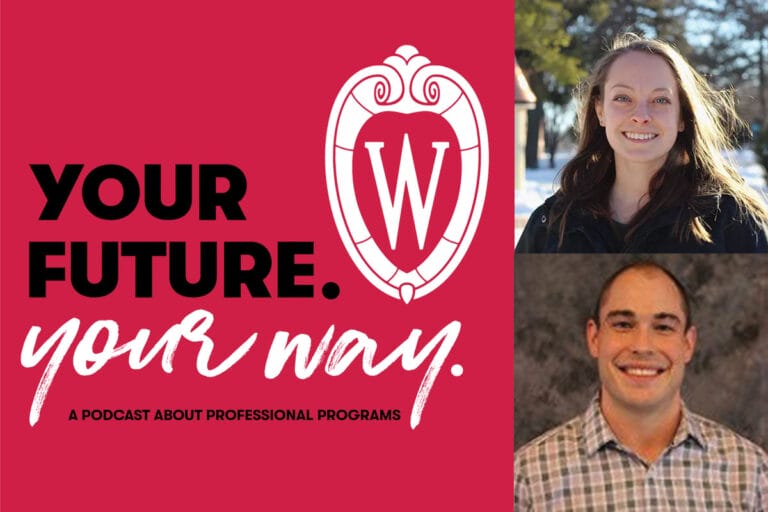
Episode 34: Career Support for Library & Information Studies Grad Students
Curious about career development opportunities for graduate students in UW–Madison’s Information School? The Library & Information Studies MA program provides personalized support to help you succeed!
Your Future. Your Way.
Episode 34: Career Support for Library & Information Studies Grad Students! (Transcript)
ALISSA OLECK: Welcome to Your Future Your Way, where we explore the many ways to reach your academic and professional goals. Whether you are a recent grad considering career advancement or even changing careers, this podcast is for you. There is more than one way to do higher education. This is Your Future. Your way.
ENROLLMENT COACH MARTA: Hi, I’m Marta McCoy, and I’m an enrollment coach for the Professional Degrees and Certificates in the Division of Continuing Studies at the University of Wisconsin-Madison. Today, we’re continuing our career services series by sharing information about the variety of career services and professional development opportunities offered to graduate students at UW-Madison’s Information School.
PDC GENERAL HOST: Before we start, we want you to know that the views, information, or opinions expressed in this podcast do not reflect the views of the Division of Continuing Studies, the University of Wisconsin-Madison, or the Board of Regents.
MARTA: Choosing a graduate program isn’t just about the classes you’ll take. It’s also about the opportunities available to help you launch or advance your career. Career support can make a big difference in how you connect with employers, gain real world experience, and prepare for your next steps after graduation. As a UW-Madison graduate student, you’ll have access to a wide range of career services designed to help you succeed, whether you’re exploring job opportunities, searching for internships, or building your professional network. In our last episode, we explored the many resources available to master’s students at UW-Madison. We covered key platforms like Handshake, which connects students with employers and Goin Global, a great tool for finding international job and internship opportunities. We also introduced BigInterview, an AI powered platform to help sharpen your interview skills and build a strong resume, along with Beyond Graduate School, an online platform providing on demand career training and job search strategies for masters students. If you missed it, be sure to check out episode 33 at pdc dot wisc dot edu slash podcast. To explore what program specific career services can look like, we’ll hear from Tanya Hendricks Cobb, graduate program manager of the Library and Information Studies master’s program here at UW-Madison, also known as the MA LIS. The program is offered in two formats, 100% online or face to face. Students develop expertise in information studies delivery and library management to become effective library leaders. Tanya will provide insights into the career resources available to students in the program, how graduates are finding success in the field, and what perspective students should know about career preparation. Let’s jump into our conversation with Tanya after this short break.
PDC GENERAL HOST: This episode of Your Future. Your Way. comes from UW-Madison professional programs, offering over 90 graduate level programs, including online and evening and weekend options for working adults. For more details, visit us at go dot wisc dot edu slash pro.
TANYA HENDRICKS COBB: Thank you for having me join you today to talk more about career services at the iSchool. So yeah, so my name, as you mentioned, is Tanya, and I have been with the iSchool for about 15 years now and have at least that many years of experience working with graduate students and providing career services to them. And I love career services. Career Services is my favorite part of my job as a graduate program manager with the Information School. In terms of the career services offered, we have a multitude of resources that I help students leverage at the campus level. In addition to that, I am here to work with students specifically in our master’s program in Library and Information Studies and really help students personalize their career pathways and the support that they get. So meeting one on one is a primary way I do that. And those appointments include everything you can imagine for career support. So that could be thinking initially about what pathways you might be interested in in the program. Again, it’s a very broad program. So students come in, sometimes really thinking they know what they want, which is great.
And sometimes students come in and they’re exploring. They know there are a lot of options, and a lot of those options interest them. And so it’s thinking about how do they learn more about those career pathways to get enough information to figure out, oh, yeah, this is a path I want to stay on. You’re not limited to one pathway either, so we will talk about strategies. If you want to come in and be ready to market yourself for public library jobs or for academic library, which is college and university jobs, there are ways to do that. So I really spend a lot of time initially learning about the student, asking them their story, what they’re interested in, looking at what unique experiences and skills and passions they are bringing to the program, because it’s really important to incorporate all of that in the career development process. And that’s the part that’s really interesting to me. I love hearing people’s stories. And helping them, so to speak, write that next chapter.
So again, the range of topics that I will meet with students on, it’s going to be everything from, okay, how do I get more hands on experience in the field? How do I connect with alums or other people in the network who I can learn about these different pathways from? So I actually spend a lot of time helping students think about networking in terms of who can I meet with just to, like, have a career conversation, what we call an informational meeting. To learn more about their career path, their day to day and their job, and to figure out if that’s something that would interest them. In addition, I hold workshops. So, for example, last month, I held a series of five workshops just on how to write an effective resume. One of the things students like about workshops is sometimes they prefer to come in as a group rather than meet with me one on one, which is totally fine. And it lets them start to connect with other students around that topic. So I will often encourage students at the end of those workshops to, like, buddy up with each other, like, support each other in what they just learned. So always making sure people are learning about who’s in the room if they haven’t met them and supporting each other, crowdsourcing, because students have a lot of their own wisdom about some of these topics. So, in addition to workshops, the high school teaches a five week one credit course every spring that primarily help students prepare for the job search. So it’s designed for students who are about to graduate, and it’s kind of sort of a like five week boot camp, right? Everything you need to do to get ready. So that’s also available. That is optional, but students can choose to add that credit, and a lot of students find that helpful.
We do career panels, usually a few times a year, sometimes built into that course, but sometimes just outside of that course, but always open to all the students. I will help students practice and prep for interviews and teach them how to know when they’re how to know when they’re hitting a winning interview answer. So really talking about what goes into that and then having them kind of assess how they think they did. So the goal is not to put students through some sort of scary, like, hour long throwing questions at them, but really to teach them what I’m looking for, what the employer is looking for, and so they can walk away from that appointment, knowing how to assess their own practice, knowing how to know if they’re hitting the mark, so to speak. Um, negotiation. So we will talk about negotiation resources, and a lot of times students assume that’s just salary, and in some cases, in some areas of the field, that’s not something you can negotiate.
But negotiation is so much more than that. That could be leave, that could be start day, that could be travel expenses, that could be benefits, things like that. So really talking about that whole package so that they’re ready when that, you know, offer comes to think about if it’s going to meet their needs. So I would say one of the things that I enjoy most about providing career services to our students is watching their journey throughout their time in the program. And, of course, the nervousness as they’re going through each step of the program, and then the job hunt because it’s, you know, it’s stressful, right? It’s a lot. But then getting that position when they, you know, started in the beginning of the program, worried if they’d be qualified or not.
I’m like, of course, you’re going to be qualified. But just kind of coaching students through that whole process. So I want it to be a really safe, supportive community for students both to grow in the program, but also, you know, to land on their feet and be successful with that first position. That is what we’re here for. And not just myself, but my colleagues in the department. We are genuinely all so excited when students take that next step. You know, we’re nervous for you when you’ve got the interviews. We’re going to help you, but we’re thinking of you. And we’re all so excited when we hear that a student’s gotten an interview or gotten a job. Like, that just makes our day.
MARTA: Graduate program staff like Tanya play a key role in connecting students with internships, employers, and valuable career opportunities. A big thank you to Tanya for sharing insights into the MA LIS programs career resources and how they support students success. We hope you found this conversation helpful and to learn more about the Library and Information Studies master’s programs, visit ischool dot wisc dot edu. Career services differ across programs, so we encourage you to connect with your program of interest to explore the support available in your field. That wraps up today’s episode. If you have any questions about any professional graduate programs offered by UW-Madison or need guidance on your application materials, an enrollment coach like myself is happy to assist you. You can reach out to them at coach at pdc dot wisc dot edu. And thank you for joining us today. We hope this episode has been helpful and inspiring as you consider applying to a program at the University of Wisconsin- Madison. ON WISCONSIN!
ALISSA: Join us next time to learn more about professional programs at the University of Wisconsin-Madison. Learn how to shape Your Future. Your Way.
Published on Apr 01 2025
Categories: Podcast: Your Future, Your Way


